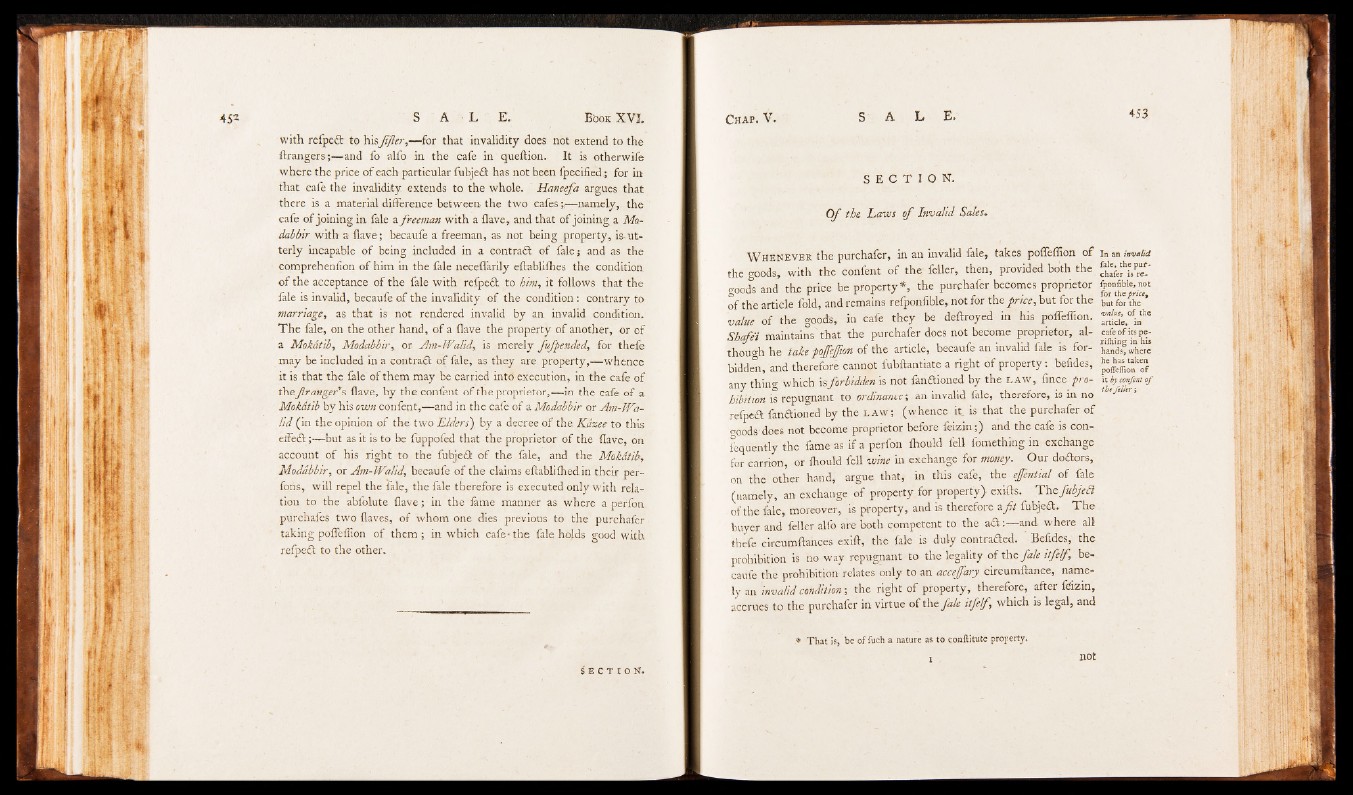
with refpect to hisJiJier,— for that invalidity does not extend to the
ftrangers;— and fo alfo in the cafe in queftion. It is otherwife
where the price of each particular fubjed has not been fpecified; for in
that cafe the invalidity extends to the whole. ' Haneefa argues that
there is a material difference between the two ca fe s— namely, the
cafe of joining in fale a freeman with a flave, and that of joining a Modabbir
with a flave; becaufe a freeman, as not being property, is-utterly
incapable of being included in a contract of fale; an4 as the
comprehenfion of him in the fale neceflarily eftablifhes the condition
of the acceptance of the fale with refped to him,, it follows that the
lale is invalid, becaufe of the invalidity of the condition: contrary to
marriage, as that is not rendered invalid by an invalid condition.
The fale, on the other hand, of a flave the property of another, or of
a Mokatib, Modabbir, or Am-WaRd, is merely fufpended, for thefe
may be included in a contrad of fale, as they are property,— whence
it is that the fale of them may be carried into execution, in the cafe of
thegranger's flave, by the confent of the proprietor,— in the cafe of a
Mokdtib by his own confent,— and in the cafe of a Modabbir ax Am-Wa-
lid (in the opinion of the two Elders), by a decree of the Kdzee to this
effed;— but as it is to be fuppofed that the proprietor of the flave, on
account of his right to the fubjed of the fale, and the Mokatib,
Modabbir, or Am-Walid, becaufe of the claims eftablifhedin their per-
fons, will repel the fale, the fale therefore is executed only with relation
to the abfolute flave; in the fame manner as where a peffon
purchafes two flaves, of whom one dies previous to the purchafer
taking poffeffion of them ; in which cafe- the fale holds good with
relped to the other.
S E C T I O N .
S E C T I O N .
O f the Laws o f Invalid Sales.
W h e n e v e r the purchafer, in an invalid fale, takes poffeffion of
the o-oods, with the confent of ther feller, then, provided both the
goods and the price be property*, the purchafer becomes proprietor
of the article fold, and remains refponfible, not for the price, but for the
value of the goods, in cafe they be deftroyed in his poffeffion.
Shafei maintainsdhat the purchafer does not become proprietor, although
he take pofefton of the article, becaufe an invalid fale is forbidden,
and therefore cannot fubftantiate a right of property: befides,
any thing Which is forbidden is not fanctioned by the l a w , fince prohibition
is repugnant to ordinance; an invalid fale, therefore, is in no
refped fandioned by the l a w ; (whence it is that the purchafer of
goods does not become proprietor before feizin;) and the cafe is con-
fequently the fame as if a perfon Ihould fell fomething in exchange
for carrion, or fhould fell wine in exchange for money. Our dodors,
on the other hand, argue that, in this cafe, the effential of fale
(namely, an exchange of property for property) exifts. T h efubjett
. of the fale, moreover, is property, and is therefore a f it fubjed. The
buyer and feller alfo are both competent to the a d :— and where all
thefe circumftances exift, the fale is duly contraded. Befides, the
prohibition is no way repugnant to the legality of tha fale itfe/f, becaufe
the prohibition relates only to an accejfary circumftance, namely
an invalid condition; the right of property, therefore, after feizin,
accrues to the purchafer in virtue of the fale itfelf, which is legal, and
* T h a t is, be of fuch a nature as to conftitute property,
i not
In an invalid
fale, the puf-
chafer is refponfible,
not
for the price,
but for the
t,value, of the
article, in
cafe o f its pe-
rilhing in his
hands, where
he has taken
poffeflion o f
it by confent o f
the feller;